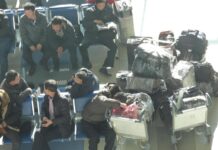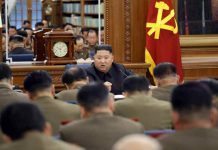“Do you know what the Supreme Commander said? A soldier’s fundamental duty is to devote his youth to his fatherland and to be loyal to the Mother Party that gave birth to us. So, I swore my allegiance to the Party and put on my uniform. But the military has shown that those who live according to the Supreme Commander can’t live or even survive out here. Allegiance? The only thing loyalty gets you is being taken to the infirmary and being medically discharged. And then, there are guys like this one who just happened to be born to the right family and who can get high and drunk in the middle of the day…”
This monologue is the heart of the newly released, defector-produced film “Two Soldiers,” which premiered Jan. 21 (available here with English subtitles). This cynical speech is delivered by young soldier Lee Kwang-hyok, the son of a farmer whose low social status is keeping him from achieving his dreams of becoming a military officer or Ministry of State Security agent. By contrast, his fellow soldier Park Jin-chol is the nephew of a political officer in the military and flexes his special privileges to carry around a laptop and cell phone while brazenly drinking whisky during his military service.
As the title implies, “Two Soldiers” compares the lives of these two soldiers to highlight the ways that North Korea’s hereditary social class system fosters discrimination and how the elite class profits off the sacrifices of ordinary people.
“North Korea is a thoroughly class-based society. North Korea claims that North Koreans are all equally ‘masters of the country,’ but if you don’t have power, you can’t escape your situation, no matter how hard you work. They say North Korea is a nation by the people, for the people, but the reality is that our country is one where those in power live well and profit off the sacrifices of the people. That’s what I wanted to show through this film.”
“Two Soldiers” is director Jeong Haneul’s first film and includes his own experiences. Jeong was born in Hamhung, North Hamgyong Province, and joined the military as an enlistee after graduating high school. He was deployed to the frontlines and later fled during sentry duty to cross the Military Demarcation Line (MDL) into South Korea in 2012. Jeong explained that the beatings and starvation he suffered in the military, as well as his growing disillusionment with North Korea’s discriminatory social system, drove his decision to defect.
Jeong now runs a YouTube channel called “Bukshital TV” with over 80,000 subscribers and has previously created content about his time in the North Korean military and shone a light on the underbelly of North Korean society. This time, we sat down with the director to ask why he decided to take on the challenge of filmmaking, discuss the deeper meaning of his work, and share some behind-the-scenes stories from the filmmaking process.
Below is Daily NK’s full interview with Director Jeong Haneul.
Daily NK: In the past, you’ve appeared quite a few times on YouTube and various TV programs to talk about North Korean military life and culture. Was there any special reason behind your decision to make a movie this time?
“[A while back] I acted for a film called “Escape [탈주],” which should be coming out this July, and consulted on North Korean military life and the northern dialect. I ended up talking with Director Lee Jong-pil about movies quite a bit, and I got a close-up look at the unique charm of filmmaking while working as an actor. I had wanted to try my hand at making a film someday, and then Unification Media Group [UMG] reached out to me and asked if I wanted to make a program about North Korean military life. I wanted to make a web drama, so I wrote out scripts for 12 episodes, but that was a bit too long, so UMG asked me to shorten it and I ended up re-working the script as a short film.”
Daily NK: Even if the movie is based on your own experiences, I imagine that creating the characters for the film wasn’t easy. Was the scriptwriting process difficult for you?
“Since it included a lot of my own experiences, I’d say that I wrote the script relatively quickly. But fleshing out the characters and their details took some time. The character Jin-chol was someone I knew back in elementary school. We happened to meet again in the military, which is when I found out he was from quite an extraordinary family background. While we were going through training for recruits, he asked me, ‘Which troop are you assigned to? I’ll follow you.’ And he did end up in the same troop of the same company I was in. He was given exemptions for every training and every assignment, and he never had to go out and do the weeding under the hot sun [like the rest of us]. Even the political guidance officers were intimidated by him, even though he was just an enlistee. Even if we were in the middle of training, he’d go off and visit his uncle who was a military cadre. That’s when I realized that he and I were living in completely different worlds.”

Daily NK: The actors in the film speak the North Korean dialect very realistically. Did you hire North Korean actors?
“No, everyone on the staff, including the actors, was South Korean. While I could have found North Korean actors, I didn’t want this to be a film where it was a bunch of North Koreans telling each other stories that we all already know. South Korean actors might have trouble nailing the accent or not know much about North Korea, but I wanted to make a film where people could learn about North Korea [including the people involved in the film themselves.] One of my friends who is also a defector came to visit the set, and I really enjoyed watching the South Korean staff and actors express their curiosity, ask him questions, and learn more about North Korea while we made the film. It reinvigorated me too to answer their questions, and I thoroughly enjoyed the filming process. I don’t think I’ll ever forget that atmosphere on the set. I coached the actors on the North Korean dialect, but even I was surprised by just how well they did. Frankly, I think they did better than some of the famous actors who do North Korean accents in big films. When I showed this movie to my defector friends, they all asked me, ‘Where did you find such good-looking defector actors?’ That’s how good their acting was. On set, I immediately corrected them whenever their accent or intonation was a bit off, and they did a great job of following along.”
Daily NK: Some of the props in the movie, such as the Jim Beam Whiskey and the BMW sports car, caught my eye during the screening. Those kinds of items are quite rare among North Korean soldiers, so is there a reason you decided to show those brands on screen?
“There was a reason. Of course, an ordinary laborer in North Korea could go their whole life and never see something like [Jim Beam or a BMW]. It would be hard even for a soldier with some high-ranking relatives, like [Jin-chol] in the film, to get their hands on those things. But the gap between the rich and the poor in North Korea has gotten wider. I wanted to purposefully show that the upper-level cadres are enjoying even more luxurious items [than I showed here.]”
Daily NK: Throughout the film, there were close-ups of a red banner in the background that reads: “For the Party, the Leader, the Motherland, and for the People!” As a director, what were your intentions behind that choice?
“That slogan is one of the ways that the party gaslights the people of North Korea. When Jin-chol is strangling Kwang-hyok, we shot it so that you can see the words ‘for the People!’ in the background. I wanted to express that North Korea’s elite class is choking the life out of the common people. And that’s when Kwang-il strikes Jin-chol on the head. Kwang-il used to suck up to the person in power, so I wanted to convey that if the people who flatter and support the elites choose to stand with the people, the elites will crumble.”
Daily NK: I can really feel your passion for performing. Do you have any plans to return to acting?
“‘Two Soldiers’ told a story about life inside North Korea, and now I am working on a film talking about defectors’ lives in South Korea. I want to continue to use media [like film] to tell people about the human rights situation in North Korea.”
Watch “Two Soldiers” (with English subtitles) here.
Translated by Rose Adams. Edited by Robert Lauler.
Please send any comments or questions about this article to dailynkenglish@uni-media.net.



















